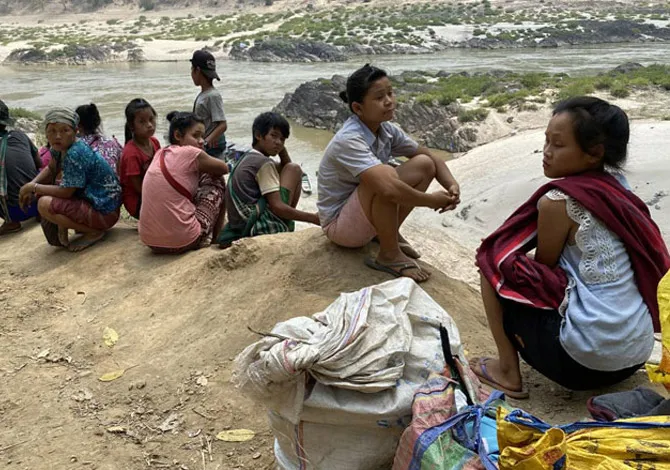
Thailand lies at a critical intersection in Southeast Asia, where the vibrant tapestry of cultures meets the complex weave of geopolitics. As the nation grapples with the escalating number of Myanmar refugees, it's not merely facing a geopolitical conundrum but a humanitarian crisis which demands global attention.
Thai Prime Minister Srettha Thavisin is actively advocating for Thailand to play a central role in engaging with the Myanmar military regime to address the two-year civil war. While agreeing to adhere to the peace plan proposed by the regional bloc Association of South East Asian Nations (ASEAN), he underscores the geographical proximity between Thailand and Myanmar, leading to an influx of displaced individuals seeking protection. This exodus, in turn, necessitates the provision of essential services to address their needs.
While agreeing to adhere to the peace plan proposed by the regional bloc Association of South East Asian Nations (ASEAN), he underscores the geographical proximity between Thailand and Myanmar, leading to an influx of displaced individuals seeking protection.
PM Srettha's recent statement indicates a shift in Thailand's approach from the previous government's stance, which largely supported the Junta, to a more humanitarian-focused role. However, the current government's engagement remains limited to the Junta, highlighting the need for broader connections with other groups.
Roots of displacement
The Kayin State, formerly the Karen State, has witnessed a history of human rights abuses perpetrated by the Junta, particularly against the Karen ethnic minority seeking greater autonomy. Well-documented instances of systematic violence, including rape, torture, and forced labour, explicitly targeting Karenni women and girls, showcase the severity of the situation. The military's use of both women and men as human shields violates international humanitarian law.
The coup has exacerbated the crisis and made these people easy targets of violence. There are restrictions on travel and a shortage of essential resources in camps for internally displaced persons (IDPs) within Myanmar. Humanitarian workers are adapting by seeking alternative routes to deliver aid materials and avoid harassment and detention by military forces. Consequently, a growing number of individuals, including men, women, and children, are seeking refuge along the Thai-Myanmar border to escape the worsening conditions.
Attending the displaced
Bangkok's historical role as a haven for displaced people, mainly from Myanmar, is evident. Since the mid-1980s, the nation has provided shelter to approximately 90,801 displaced people from Myanmar across nine camps. However, following the coup in Myanmar in February 2021, an additional 45,025 displaced people sought refuge. Thailand's humanitarian efforts include providing temporary shelters, a few core relief items, food, and medical assistance.
Humanitarian workers are adapting by seeking alternative routes to deliver aid materials and avoid harassment and detention by military forces.
Despite allowing these new arrivals to stay in temporary shelters near the border, the Thai government has sporadically pushed them back. Notably, these recently displaced populations are not allowed to enter established refugee camps, and Thai officials impose stringent restrictions on their movement.
In July 2023, around 9,000 hapless people sought safety in Thailand's Mae Hong Son district due to frequent airstrikes in Karenni State. Initially, Thai authorities permitted them to stay in temporary shelters, however, on 21 October, they were asked to return to Myanmar within two weeks. Consequently, the shelters were vacated as people walked back across the border into Karenni State, a journey taking four to five days. Many resettled in Doh Noh Ku, a settlement for internally displaced people at the Thai-Myanmar border.
Pushbacks persisted until 27 October, coinciding with an offensive by a coalition of armed ethnic and resistance groups against the Myanmar military in northern Shan State. Subsequently, opposition forces elsewhere in Myanmar launched attacks against the military, prompting retaliatory airstrikes, including in Karenni State. By 27 November, over 2,387 Myanmar individuals had fled again, crossing back into the Mae Hong Son district.
The Thai Foreign Minister's announcement on 3 December to construct shelters for displaced people underscores a recognition of the escalating violence and the potential for more people to seek refuge.
Pushbacks persisted until 27 October, coinciding with an offensive by a coalition of armed ethnic and resistance groups against the Myanmar military in northern Shan State.
On 8 December, Thailand's Ministry of Foreign Affairs disclosed that Myanmar officials had reached an agreement to establish a task force to enhance humanitarian aid for those displaced within Myanmar due to the ongoing conflict. Despite good intentions, concerns arise about the effective distribution of assistance to all affected regions, considering the track record of the Junta.
Predicaments
Thailand's response to the crisis is challenging. The delicate balance between engaging with the Myanmar military regime and advocating for humanitarian provisions poses a diplomatic dilemma. The strain on resources and infrastructure due to the growing refugee population is a significant concern. The need for sustained efforts, both domestically and through international collaboration, is crucial to address the humanitarian crisis effectively.
Thailand's response is constrained by its non-ratification of the 1951 Refugee Convention or 1967 Protocol. However, in 2018, Thailand voted in favour of the Global Compact on Refugees, and subsequently, the National Screening Mechanism (NSM) was established in 2019. The NSM aims to grant “protected person” status to foreign nationals in Thailand who are unable or unwilling to return to their home countries due to a well-founded fear of persecution, as determined by the NSM Committee. Despite delays in application due to the COVID-19 pandemic, in March 2023, Thailand's Cabinet approved a regulation outlining the procedure and eligibility criteria for individuals seeking NSM status, which officially came into effect on September 2023. Additionally, the rollout of the NSM will occur incrementally as the Thai government, with technical assistance and advocacy from UNHCR, continues to develop the comprehensive set of procedural standards and policies needed for its implementation.
The NSM aims to grant “protected person” status to foreign nationals in Thailand who are unable or unwilling to return to their home countries due to a well-founded fear of persecution, as determined by the NSM Committee.
However, concerns exist regarding the NSM's effectiveness and legal subordination to the Immigration Act. While Clause 15 of the NSM regulation delays the deportation of individuals asserting protected-person status, it fails to shield them from arrest, detention, or prosecution based on their immigration status. Additionally, as the NSM is legally subordinate to the Immigration Act, the predominant experience for refugees seeking protection under the NSM in Thailand would involve initial encounters with arrest, detention, and prosecution. There also remains apprehension that the NSM excludes migrant workers from Myanmar, Cambodia, and Laos under its provision from receiving adequate protection in Thailand.
Actions required
To address the challenges, the Thai government should utilise the power granted by Section 17 of the Immigration Act to exempt NSM applicants from arrest, detention, or prosecution. Explicit provisions for determining protected status under NSM need to be established. Exempting refugees from arrest, detention, and prosecution under the Immigration Act, as emphasised in an open letter by eight organisations on 12 December, will signal Thailand's commitment to the Global Compact on Refugees.
Urgent action from Thai authorities is imperative to enhance efforts in granting appropriate status and protection to those fleeing persecution, aligning with international standards.
The escalating Myanmar refugee crisis necessitates a comprehensive and swift response from Thai authorities. While challenges persist, Thailand can set an example in the region by implementing essential refugee policies. Addressing humanitarian concerns, engaging in regional cooperation, and enacting necessary policy reforms are imperative for Thailand to effectively manage the evolving crisis and provide sustainable solutions for refugees and displaced persons.
Sreeparna Banerjee is a Junior Fellow at the Observer Research Foundation
The views expressed above belong to the author(s). ORF research and analyses now available on Telegram! Click here to access our curated content — blogs, longforms and interviews.




 PREV
PREV


